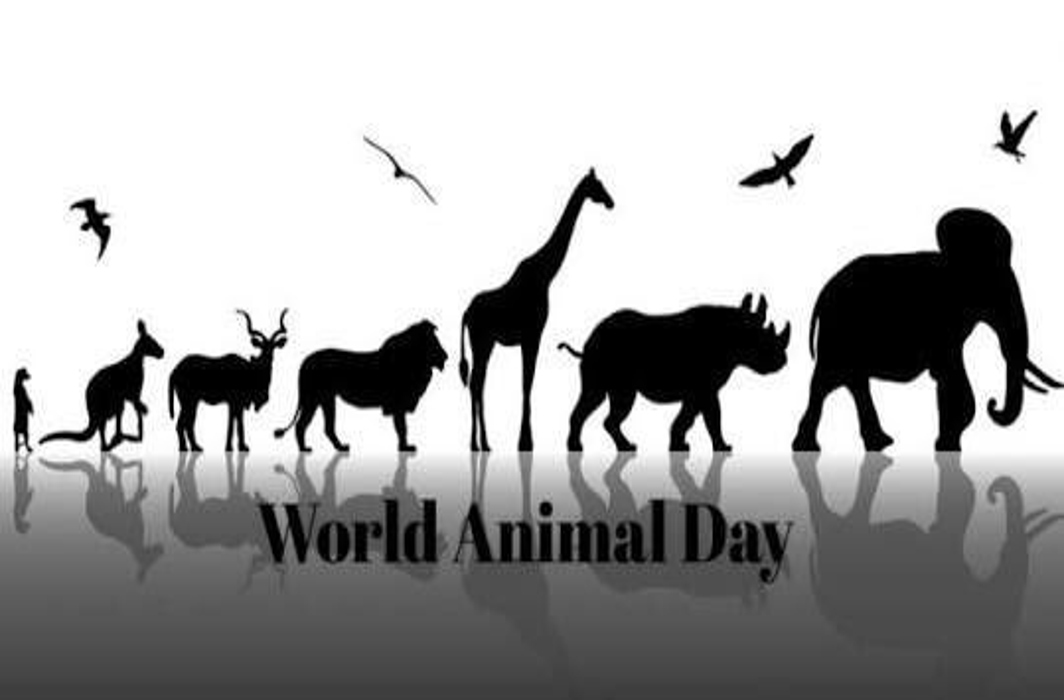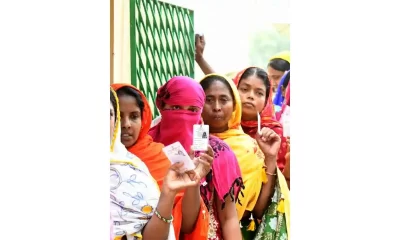Latest world news
World Animal Day 2019, October 4: Feast Day of Francis of Assisi
October 4, the feast day of Francis of Assisi, the patron saint of animals, is celebrated as World Animal Rights Day. First observed in 1925 by cynologist Heinrich Zimmermann in Germany, it aims to raise the status of animals and improve their welfare standards.

[vc_row][vc_column][vc_column_text]October 4, the feast day of Francis of Assisi, the patron saint of animals, is celebrated as World Animal Rights Day. First observed in 1925 by cynologist Heinrich Zimmermann in Germany, it aims to raise the status of animals and improve their welfare standards.
Every country celebrates World Animal Day differently and strives to create awareness about the rights of the animal. WAD also creates awareness about endangered species and how we can protect them.
On the occasion, many took to twitter celebrating their favorite pets and animals that enhances Human lives on earth. [/vc_column_text][/vc_column][/vc_row][vc_row][vc_column][vc_raw_html]JTNDYmxvY2txdW90ZSUyMGNsYXNzJTNEJTIydHdpdHRlci10d2VldCUyMiUzRSUzQ3AlMjBsYW5nJTNEJTIyZW4lMjIlMjBkaXIlM0QlMjJsdHIlMjIlM0VIYXBweSUyMCUzQ2ElMjBocmVmJTNEJTIyaHR0cHMlM0ElMkYlMkZ0d2l0dGVyLmNvbSUyRmhhc2h0YWclMkZXb3JsZEFuaW1hbERheSUzRnNyYyUzRGhhc2glMjZhbXAlM0JyZWZfc3JjJTNEdHdzcmMlMjU1RXRmdyUyMiUzRSUyM1dvcmxkQW5pbWFsRGF5JTNDJTJGYSUzRSUyMSUyMCVGMCU5RiU5MCVCRSUyMCUzQ2JyJTNFRXVyb3BlJTIwaXMlMjBob21lJTIwdG8lMjB0aGUlMjBsYXJnZXN0JTIwbmV0d29yayUyMG9mJTIwcHJvdGVjdGVkJTIwYXJlYXMlMjBpbiUyMHRoZSUyMCVGMCU5RiU4QyU4RCUyMCUzQ2JyJTNFT3VyJTIwZ29hbCUyMGlzJTIwdG8lMjBrZWVwJTIwcHJvdGVjdGluZyUyMGljb25pYyUyMGFuaW1hbHMlMjBmcm9tJTIwTm9ydGglMjB0byUyMFNvdXRoJTIwYW5kJTIwZnJvbSUyMEVhc3QlMjB0byUyMFdlc3QlMjElMjAlM0NiciUzRVdlJTIwd29yayUyMHRpcmVsZXNzbHklMjB0byUyMGVuc3VyZSUyME5hdHVyZSUyMHRocml2ZXMuJTNDYnIlM0UlMjAlRjAlOUYlOTElODklRjAlOUYlOEYlQkQlMjAlM0NhJTIwaHJlZiUzRCUyMmh0dHBzJTNBJTJGJTJGdC5jbyUyRm1xdjBadEZIQ1glMjIlM0VodHRwcyUzQSUyRiUyRnQuY28lMkZtcXYwWnRGSENYJTNDJTJGYSUzRSUzQ2ElMjBocmVmJTNEJTIyaHR0cHMlM0ElMkYlMkZ0d2l0dGVyLmNvbSUyRmhhc2h0YWclMkZCaW9kaXZlcnNpdHkyMDIwJTNGc3JjJTNEaGFzaCUyNmFtcCUzQnJlZl9zcmMlM0R0d3NyYyUyNTVFdGZ3JTIyJTNFJTIzQmlvZGl2ZXJzaXR5MjAyMCUzQyUyRmElM0UlMjAlM0NhJTIwaHJlZiUzRCUyMmh0dHBzJTNBJTJGJTJGdC5jbyUyRnFTNzV3N2MzdnolMjIlM0VwaWMudHdpdHRlci5jb20lMkZxUzc1dzdjM3Z6JTNDJTJGYSUzRSUzQyUyRnAlM0UlMjZtZGFzaCUzQiUyMEVVJTIwRW52aXJvbm1lbnQlMjAlMjglNDBFVV9FTlYlMjklMjAlM0NhJTIwaHJlZiUzRCUyMmh0dHBzJTNBJTJGJTJGdHdpdHRlci5jb20lMkZFVV9FTlYlMkZzdGF0dXMlMkYxMTgwMDIxOTE0NjU3NTc0OTEzJTNGcmVmX3NyYyUzRHR3c3JjJTI1NUV0ZnclMjIlM0VPY3RvYmVyJTIwNCUyQyUyMDIwMTklM0MlMkZhJTNFJTNDJTJGYmxvY2txdW90ZSUzRSUyMCUzQ3NjcmlwdCUyMGFzeW5jJTIwc3JjJTNEJTIyaHR0cHMlM0ElMkYlMkZwbGF0Zm9ybS50d2l0dGVyLmNvbSUyRndpZGdldHMuanMlMjIlMjBjaGFyc2V0JTNEJTIydXRmLTglMjIlM0UlM0MlMkZzY3JpcHQlM0UlMEElMEElM0NibG9ja3F1b3RlJTIwY2xhc3MlM0QlMjJ0d2l0dGVyLXR3ZWV0JTIyJTNFJTNDcCUyMGxhbmclM0QlMjJlbiUyMiUyMGRpciUzRCUyMmx0ciUyMiUzRVJlc2VhcmNoJTIwc2hvd3MlMjB0aGF0JTIwZG9ncyUyQyUyMGNhdHMlMjBhbmQlMjBvdGhlciUyMGFuaW1hbHMlMjBjYW4lMjByZWR1Y2UlMjB0aGUlMjBuZWdhdGl2ZSUyMGltcGFjdCUyMG9mJTIwd29yayUyMG9uJTIwb3VyJTIwbWVudGFsJTIwaGVhbHRoLiUyMFRlbGwlMjB1cyUyMGhvdyUyMHlvdXIlMjBwZXQlMjBoZWxwcyUyMHlvdSUyMHRoaXMlMjAlM0NhJTIwaHJlZiUzRCUyMmh0dHBzJTNBJTJGJTJGdHdpdHRlci5jb20lMkZoYXNodGFnJTJGV29ybGRBbmltYWxEYXklM0ZzcmMlM0RoYXNoJTI2YW1wJTNCcmVmX3NyYyUzRHR3c3JjJTI1NUV0ZnclMjIlM0UlMjNXb3JsZEFuaW1hbERheSUzQyUyRmElM0UlMjAlRjAlOUYlOTAlOTUlRjAlOUYlOTAlODglMjAlM0NhJTIwaHJlZiUzRCUyMmh0dHBzJTNBJTJGJTJGdC5jbyUyRjZ1V1hyUUMyc0UlMjIlM0VodHRwcyUzQSUyRiUyRnQuY28lMkY2dVdYclFDMnNFJTNDJTJGYSUzRSUyMCUzQ2ElMjBocmVmJTNEJTIyaHR0cHMlM0ElMkYlMkZ0LmNvJTJGczdzMGJWanF6diUyMiUzRXBpYy50d2l0dGVyLmNvbSUyRnM3czBiVmpxenYlM0MlMkZhJTNFJTNDJTJGcCUzRSUyNm1kYXNoJTNCJTIwU2FtYXJpdGFucyUyMCUyOCU0MHNhbWFyaXRhbnMlMjklMjAlM0NhJTIwaHJlZiUzRCUyMmh0dHBzJTNBJTJGJTJGdHdpdHRlci5jb20lMkZzYW1hcml0YW5zJTJGc3RhdHVzJTJGMTE4MDAxNDg3Mjc3NzY5MTEzNiUzRnJlZl9zcmMlM0R0d3NyYyUyNTVFdGZ3JTIyJTNFT2N0b2JlciUyMDQlMkMlMjAyMDE5JTNDJTJGYSUzRSUzQyUyRmJsb2NrcXVvdGUlM0UlMjAlM0NzY3JpcHQlMjBhc3luYyUyMHNyYyUzRCUyMmh0dHBzJTNBJTJGJTJGcGxhdGZvcm0udHdpdHRlci5jb20lMkZ3aWRnZXRzLmpzJTIyJTIwY2hhcnNldCUzRCUyMnV0Zi04JTIyJTNFJTNDJTJGc2NyaXB0JTNFJTBBJTNDYmxvY2txdW90ZSUyMGNsYXNzJTNEJTIydHdpdHRlci10d2VldCUyMiUzRSUzQ3AlMjBsYW5nJTNEJTIyZW4lMjIlMjBkaXIlM0QlMjJsdHIlMjIlM0VUaGlzJTIwJTNDYSUyMGhyZWYlM0QlMjJodHRwcyUzQSUyRiUyRnR3aXR0ZXIuY29tJTJGaGFzaHRhZyUyRldvcmxkQW5pbWFsRGF5JTNGc3JjJTNEaGFzaCUyNmFtcCUzQnJlZl9zcmMlM0R0d3NyYyUyNTVFdGZ3JTIyJTNFJTIzV29ybGRBbmltYWxEYXklM0MlMkZhJTNFJTIwd2UlMjB3YW50JTIwdG8lMjB0aGFuayUyMFlPVSUyMGZvciUyMGhlbHBpbmclMjB3aWxkbGlmZSUyMGluJTIwbmVlZC4lMjBCeSUyMHNsb3dpbmclMjBkb3duJTIwb24lMjB0aGUlMjByb2FkcyUyQyUyMGtlZXBpbmclMjB5b3VyJTIwcGV0cyUyMG91dCUyMG9mJTIwdHJvdWJsZSUyMGFuZCUyMHN1cHBvcnRpbmclMjB0aGUlMjBsaWZlc2F2aW5nJTIwd29yayUyMGF0JTIwdGhlJTIwJTNDYSUyMGhyZWYlM0QlMjJodHRwcyUzQSUyRiUyRnR3aXR0ZXIuY29tJTJGQXVzdHJhbGlhWm9vJTNGcmVmX3NyYyUzRHR3c3JjJTI1NUV0ZnclMjIlM0UlNDBBdXN0cmFsaWFab28lM0MlMkZhJTNFJTIwV2lsZGxpZmUlMjBIb3NwaXRhbCUyQyUyMHlvdSVFMiU4MCU5OXJlJTIwaGVscGluZyUyMHRvJTIwY3JlYXRlJTIwYSUyMGJldHRlciUyMHdvcmxkJTIwZm9yJTIwb3VyJTIwbmF0aXZlJTIwYW5pbWFscy4lMjAlM0NhJTIwaHJlZiUzRCUyMmh0dHBzJTNBJTJGJTJGdC5jbyUyRkJKTnZhbndQQ1MlMjIlM0VwaWMudHdpdHRlci5jb20lMkZCSk52YW53UENTJTNDJTJGYSUzRSUzQyUyRnAlM0UlMjZtZGFzaCUzQiUyMFdpbGRsaWZlJTIwV2FycmlvcnMlMjAlMjglNDB3aWxkd2FycmlvcnMlMjklMjAlM0NhJTIwaHJlZiUzRCUyMmh0dHBzJTNBJTJGJTJGdHdpdHRlci5jb20lMkZ3aWxkd2FycmlvcnMlMkZzdGF0dXMlMkYxMTc5OTk1MTMwMDIwODA2NjU2JTNGcmVmX3NyYyUzRHR3c3JjJTI1NUV0ZnclMjIlM0VPY3RvYmVyJTIwNCUyQyUyMDIwMTklM0MlMkZhJTNFJTNDJTJGYmxvY2txdW90ZSUzRSUyMCUzQ3NjcmlwdCUyMGFzeW5jJTIwc3JjJTNEJTIyaHR0cHMlM0ElMkYlMkZwbGF0Zm9ybS50d2l0dGVyLmNvbSUyRndpZGdldHMuanMlMjIlMjBjaGFyc2V0JTNEJTIydXRmLTglMjIlM0UlM0MlMkZzY3JpcHQlM0UlMEE=[/vc_raw_html][/vc_column][/vc_row][vc_row][vc_column][vc_column_text]
Global wildlife trade- 50% higher than previous estimates
More than 5,500 species of birds, mammals, amphibians and reptiles are bought and sold on the worldwide animal market, about 50% higher than previous estimates, a study published in Science said Thursday, October 3.
The scientists at the University of Florida and University of Sheffield who jointly analyzed data collated on a range of species, said they are “astounded” by the figure.
Prof David Edwards of the University of Sheffield, a co-researcher on the study, said, “The sheer diversity of species being traded is astounding – the risk that that will grow is very worrying.”
According to their analysis, 5,579 animals – 18% of vertebrates – are currently being traded globally.
The study also identified hotspots for traded birds, mammals, amphibians and reptiles in regions within the Andes mountain range and Amazon rainforest, sub-Saharan Africa, South East Asia and Australia.
Also Read: Big mistake to shoot down own Mi-17, action against two officers: IAF Chief Bhadauria
The research also identified another 3,000 or so species that look set to be traded in the future, based on their similarities with animals currently bought and sold – for example, the African pangolin, which started to be exploited after Asian pangolins became harder to find.
“If one species is traded, the chances are its evolutionary cousins are also traded,” said Dr Brett Scheffers of the University of Florida.
The legal and illegal wildlife trade, in the likes of horns, ivory and exotic pets, is the number one cause of animal extinction and recognized as one of the most severe threats to biodiversity. Therefore, scientists emphasized the need for proactive rather than reactive strategies to protect exploitation of this wild life.
Prof Edwards said, “Without urgent focus on how to stem both the supply and demand for wild-caught species, there is a real danger that we will lose many traded species.”
Also Read: Bihar Flood: A Blame Game erupts between BJP, JDU as Patna remains flooded
“Often, species are flagged for conservation only after a severe decline is documented,” they concluded.
The UK/US team used data from the Convention on International Trade in Endangered Species of Wild Flora and Fauna and the International Union for Conservation of Nature on about 30,000 bird, mammal, amphibian and reptile species. They did not look at invertebrates or marine animals.[/vc_column_text][/vc_column][/vc_row]
Latest world news
Bigg Boss 14 contestant Rahul Vaidya struggles walking in knee deep water, compares Dubai rains with Mumbai floods
Singer and TV personality Rahul Vaidya was recently stranded in the Dubai rains.

Rahul Vaidya, who was in Dubai ahead of his show which was scheduled to take place today, left the country due to heavy rains and reached Kolkata. The artist shared on social media his encounters in the UAE city, including challenges like walking through knee-deep water. Rahul provided an update regarding the heavy rainfall in Dubai on his Instagram profile.
The Bigg Boss 14 contestant revealed that he was in Kolkata and prepared to do an evening performance. Recalling the terrifying period he went through, Vaidya said there was a lot of confusion and panic in Dubai. The situation was similar to that when heavy floods hit Mumbai in 2005.
Vaiday also posted seval other images and videos of cars that were underwater and flooded roadways. The Bigg Boss 14 contestant, who shared his ordeal, claimed that even though it had just rained for two hours, the situation was dire.
In one of the video, which went viral he can be seen struggling in walking in knee-deep water. He can be also seen holding his sneakers in one hand and with other hand he was seen managing other things.
This is the result of the two hours of rain that it had, he can be heard saying in the video. Vidya also said he dosen’t believe Dubai is accustomed to a lot of rain. Everything had stopped working, he remarked.
After taking part in the first season of the singing reality show Indian Idol, Rahul Vaidya gained widespread recognition. In addition to Bigg Boss, he took part in Khatron Ke Khiladi 11.
Meanwhile, heavy rains that triggered flooding in the UAE and Bahrain, which left 18 people dead in Oman on Sunday and Monday, have paralyzed the financial hub of the Middle East, Dubai.
A lot of incoming flights were diverted from Dubai’s international airport because of the rain. At 7:26 p.m., the busiest airport in the world for foreign visitors stopped accepting new arrivals; a gradual resumption was announced for more than two hours later.
Images of planes navigating flooded tarmacs are making the rounds on social media.
According to pictures shared on social media, the flagship malls Dubai Mall and Mall of the Emirates both experienced heavy floods, while at least one Dubai Metro station had water up to the ankles.
There were several road collapses, severe flooding in residential areas, and numerous reports of leaks from windows, doors, and roofs.
Due to the unfavourable weather, schools around the United Arab Emirates were forced to close, and as more storms are predicted, the closures are anticipated to last until Wednesday. The government of Dubai allowed its staff to work remotely till this Wednesday.
Latest world news
Dubai sky turns green during storm in UAE, video goes viral
The UAE witnessed record-breaking rainfall on Tuesday and the National Centre of Meteorology recorded 254 mm of rainfall in less than 24 hrs in the Khatm Al Shakla area in Al Ain.

1 person was killed in UAE as it witnessed heavy rainfall on Tuesday, stranding commuters, flooding roads, disrupting trains and flights and resulting in water leakage from mall ceilings. The UAE witnessed record-breaking rainfall on Tuesday and the National Centre of Meteorology recorded 254 mm of rainfall in less than 24 hrs in the Khatm Al Shakla area in Al Ain. It is being said that the rainfall was the highest documented since the start of data collection in 1949.
The heavy rainfall in UAE came days after a similar situation in neighbouring Oman, where 13 people were killed in flash floods. Many parts of Oman saw torrential rains, which caused students to be trapped in buses and swept away motorists and trapped people in their homes.
Videos from Dubai circulating on social media showed widespread waterlogging on roads in Abu Dhabi, Dubai and other important cities. This left daily commuters in cars and other vehicles struggling to get back home. Dubai metro station too was seen flooded and closed.
One such video circulating on social media shows the aerial view of the city of Dubai from the top of a building. In the video the stormy winds are seen blowing over the city of Dubai. As the storm intensifies the Dubai sky turns green and ultimately gets covered by heavy rainfall. The video has gone viral on social media with more than 1.1 million views.
Another video showed water leakage from the ceilings of shopping malls, flooding the floors and destroying goods. A video which was shot in the famous Mall of the Emirates, showed pieces of ceiling falling as the rainwater gushed inside. Videos from many outlets of the Deira City Centre mall chain showed escalators being rendered unusable. Majid Al Futtaim, the company which owns the Mall of Emirates, said that the shopping complexes have been kept open and the customers are being sent away from the flooded areas.
India News
Sri Lankan Minister Douglas Devananda says statements on reclaiming Katchatheevu island from Sri Lanka have no ground
Devananda told the media on Thursday that it is not unusual to hear such claims and counterclaims about Katchatheevu as elections are taking place in India.

Sri Lankan Minister Douglas Devananda has said the statements from some political leaders in India on reclaiming Katchatheevu from the island nation have no ground. He told the media on Thursday that it is not unusual to hear such claims and counterclaims about the strategic island as elections are taking place in India.
The Sri Lankan Minister said he thought India is acting on its interests to secure this place to ensure Sri Lankan fishermen would not have any access to that area and that Sri Lanka should not claim any rights in that resourceful area. According to the 1974 agreement, Devananda said Indian and Sri Lankan fishermen can go fishing in the territorial waters of both countries until the pact was reviewed and amended in 1976.
The amended agreement resulted in fishermen from both countries being barred from fishing in neighboring waters. India’s ministry of External Affairs (MEA) on Thursday steered clear of the row surrounding Katchatheevu island. To a volley of questions on the Katchatheevu issue, MEA spokesperson Randhir Jaiswal reffered to External affairs Minister S Jaishankar’s recent comments on the matter.
He said he would like to talk about the issue that has been raised. He added the External Affairs minister has spoken to the press here in Delhi and also in Gujarat and has clarified all the issues. He said everyone should look into the press engagements and they would find the answers to their questions there.
The remarks from Devananda, a Sri Lankan Tamil, came days after the Narendra Modi government accused the Congress and its ally DMK in Tamil Nadu of overlooking national interests by handing over Katchatheevu island to Sri Lanka in 1974. The BJP has also been slamming the 2 parties for not ensuring the rights of the fishermen wanting to fish in waters around the island.
-

 2024 Lok Sabha Elections22 hours ago
2024 Lok Sabha Elections22 hours agoPrime Minister Narendra Modi urges citizens to vote in record numbers as voting for first phase of Lok Sabha elections begins on 102 seats across India
-

 Entertainment17 hours ago
Entertainment17 hours agoDo Aur Do Pyaar social media review: Social media users say Vidya Balan, Pratik Gandhi deliver standout performances in this adorable film
-

 2024 Lok Sabha Elections18 hours ago
2024 Lok Sabha Elections18 hours agoLok Sabha elections 2024: Amit Shah files nomination from Gandhinagar
-

 Entertainment19 hours ago
Entertainment19 hours agoYami Gautam starrer Article 370 releases on Netflix today
-

 2024 Lok Sabha Elections21 hours ago
2024 Lok Sabha Elections21 hours agoKamal Haasan, Rajinikanth, Vijay Sethupathi, Dhanush vote in Chennai
-

 2024 Lok Sabha Elections14 hours ago
2024 Lok Sabha Elections14 hours agoDeserted by key supporters, the Kamal Nath story looks set to wind to an end in Chhindwara
-

 2024 Lok Sabha Elections21 hours ago
2024 Lok Sabha Elections21 hours agoLok Sabha elections 2024: TMC, BJP workers clash in West Bengal’s Cooh Behar ahead of voting
-

 Entertainment16 hours ago
Entertainment16 hours agoAditya Roy Kapur, Sara Ali Khan’s Metro In Dino to release this November







